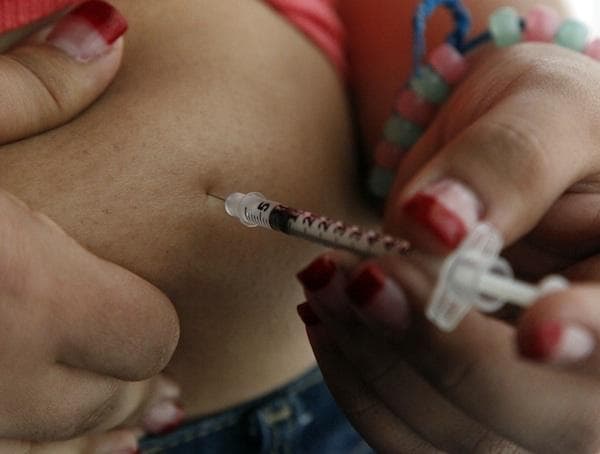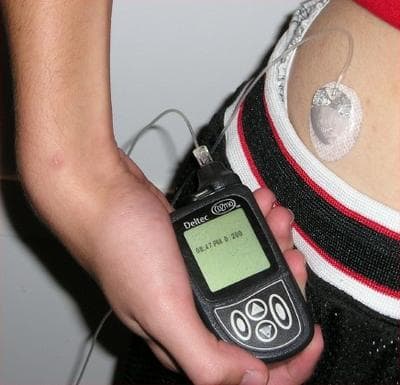Advertisement
Ultimate Eating Disorder? Lose Weight Instantly But Risk Death

You could say it began with a big bowl of chocolate pudding. After days on a starvation diet, 14-year-old Maryjeanne broke down and devoured the whole bowl, spooning the forbidden chocolate sweetness into her mouth straight from the fridge.
Then the regret hit, and the shame. She had failed her 600-calorie-a-day diet. What to do now? She'd had Type 1 diabetes since age 10, and knew she should take some extra insulin to counterbalance all the pudding she'd just eaten. Or she could make a darker choice. She writes in her recent memoir, Eating to Lose:
I skipped my insulin that night. It was my penance.
The next day I lay in my hospital bed with five intravenous tubes connecting the insides of my arms, ankles, and neck to the stark walls of that room. There was not a single ounce of energy left in me. My mouth was drier than Arizona sand. My stomach felt as though it had expelled every morsel of food I had ever eaten. The muscles along my torso felt bruised from endless violent heaving; my insides now entirely evacuated. The combination of this torturous diet and the resulting chocolate pudding binge had cost me two collapsed lungs and nearly ten pounds of weight loss, consisting not of fat, mind you, but primarily of essential bodily fluids.
Maryjeanne had entered the world of "diabulimia," an eating disorder specific to people with Type 1 diabetes, usually young women. The "bulimia" in the name refers to a diabetic method for purging calories: Instead of vomiting up food as typical bulimics do, someone with diabulimia skips or skimps on insulin, so that blood sugar is "purged" in urine instead of being absorbed and used for energy by the body's tissues.
The effect can be instant weight loss. Also instant medical crisis, and devastating long-term damage.
Diabulimia offers perhaps the starkest example there is of the harsh "logic" of an eating disorder, an urge to lose weight so overwhelming that health no longer seems to matter. And young women with Type 1 diabetes are two to three times more prone to eating disorders than those without, research finds. The overall prevalence of diabulimia is estimated at up to 1.4 million Americans.
If a young woman is already at risk for an eating disorder, and then she experiences weight loss in a day or two from skipping insulin, "It's outrageously reinforcing," said Dr. Ann Goebel-Fabbri of the Joslin Diabetes Center. "That's a more powerful and dangerous calorie purge than any other eating disorder symptom."
The price is also exceptionally high.
Diabulimia appears to triple the risk that a diabetes patient will die prematurely, according to a study Dr. Goebel-Fabbri co-authored. Complications can also include blindness, kidney failure, amputation and heart damage.
Yet research suggests that up to one-third of young women with Type 1 Diabetes sometimes omit or restrict insulin to control weight.
In "Eating To Lose," apparently the first published diabulimia memoir, Maryjeanne Hunt — now a 51-year-old financial adviser and life insurance agent living in Millis, MA — shares her 22-year journey through diabulimia and her insights into how and why it takes hold.
When she was about 14, she looked in the mirror and realized she was no longer a "twiggy little 55-pound 10-year-old." As she began to try to lose weight, she recalled how the pounds had fallen off her when her diabetes was undiagnosed and uncontrolled. Though she knew it was dangerous, and quickly landed in the hospital, she began to skip insulin doses.

"You make a deal with yourself," she said in an interview. "You say, 'I'm not going to do that again. Now I'm going to actually stick to the diet for as along as it takes.' But then you get more and more restrictive — 'Oh, the weight's not coming off fast enough. Let me try 800 calories a day. Or 600.' You get malnourished and famished, so then you binge on something calorie-dense, and you feel regret.
And the regret causes desperation, and you say, 'I know what I'm going to do, then. I'm going to eat everything, get my sugar high again and lose weight quickly.' Because you've done all this great work starving yourself for days and then you've killed it in one mindless nibble. The starvation triggers the binge, the binge triggers the decision to [omit insulin] and that triggers a promise to yourself that you're going to starve again. So you just continue the cycle."
To back up for a moment: Diabulimia is a popular term rather than a formal medical diagnosis, though it is starting to turn up in research papers. Ann Goebel-Fabbri of the Joslin Diabetes Center, a psychologist who both researches the disorder and treats patients with it, explains the physical aspect:
"Unlike Type 2 diabetes, which is so much in the news lately and associated with obesity, Type 1 is an autoimmune disease in which the immune system attacks the cells of the pancreas that produce insulin. Once the food we eat has been digested and converted into basic sugar, insulin allows our bodies to take that sugar out of the bloodstream and put it into the tissues that need it.
So that glucose from the blood is basically the primary source of energy to our bodies, and if you don't have that — if a person who needs insulin is not taking it — the calories from the glucose are not able to come out of the blood and be used by the tissue."
Here's how Maryjeanne Hunt explains diabulimia biochemistry when she gives public talks:
When someone with diabetes doesn't have adequate insulin, sugar accumulates in the blood instead of being used by cells. The body manufactures ketones (toxic chemicals that are produced when sugar is inaccessible for energy). Ketones build up in the blood and the blood becomes toxic and acidic. The body tries to rid itself of the toxins through excessive urination and vomiting, which leads to extreme dehydration and rapid weight loss as the body sheds fluids along with fat and broken down tissue. The entire process is called diabetic ketoacidosis (DKA). DKA is a medical emergency and can become fatal.
That imbalance in the blood is not only dangerous, Maryjeanne Hunt recalls, it's deeply unpleasant. "You get to the point where you are starting to develop signs of high blood sugar: incredible thirst, and nausea, and the symptoms start sort of gradually but then you sit with them a little and they get worse and worse.
"You know you have to sit with the feeling just for long enough that you can purge those calories you just consumed," she said. "When I first started out doing it, I didn't know what was long enough — I would just be with the disgustingly ill feeling until I got on the scale and saw it had dropped five pounds. It could be one night, or a couple of days, but often ended in the ER."
Maryjeanne's diabulimia seemed to run in phases. She could go through many months of starve-binge-DKA cycles, but she also had long periods, particularly after she married and through her pregnancy with twins, when it was largely dormant. When her twins were two, she had a relapse, and finally sought help, beginning with a confession to her doctor that she had been misusing her insulin.
"Eating To Lose" focuses largely on how she healed from her diabulimia, beginning with therapy focused partly on the weight-loss obsession her mother modeled. Her healing process is broader, though, as she grapples with far wider societal issues of self esteem and perfectionism.
Ann Goebel-Fabbri of the Joslin says that eating disorders can vary widely among women with Type 1 diabetes. But among those who skip insulin, she said, one thing seems clear: as with other eating disorders, threats are not effective.
“That’s part of what I try to explain to health care providers,” she said, “Because this is outrageously frustrating, when you’re faced with a patient who you’re worried about, and you feel so helpless to reach out and make a difference. It feels like a ticking time bomb, and oftentimes providers and certain family members will resort to threats: ‘You know this will not end well, you’ll lose your leg.’ Actually, that’s a great way to lose your patient.

Patients know the long-term risks, she said, but the problem is that the danger looms “some unknowable time down the road.” She draws attention instead to the present: “What are you losing from this behavior? People grow very accustomed to this feeling but high blood sugars feel like you’re slogging through mud. People feel extremely low energy, poor appetite, nausea, fuzzy in their thinking, they can’t focus their minds, their emotions are harder to contain. All these things that will really put a major cloud over their present-day quality of life.”
She also uses an established arsenal of therapy techniques for eating disorders; among them, she tries to ascertain why patients are loath to give up their insulin abuse, and reassures them that stopping the abuse will not mean getting fat. Their bodies need to rebuild themselves as they heal, she says, but that is different from getting fat.
But more research is needed, she says, to determine how best to treat diabulimia. Over the last few years, research has focused on defining the disorder, its prevalence and understanding the medical risks. “What we really need is to take that next step,” she said. “Okay, now we know that it’s a huge women’s health problem in diabetes. So what do we do about it? How do we best treat this and even possibly prevent this?”
One helpful tool, she says, would be a quick screening questionnaire that doctors could use to identify which diabetes patients might be at risk or already skipping insulin to lose weight.
Maryjeanne Hunt hopes stories like hers will help, both to raise awareness and to encourage people with diabulimia to seek treatment from a team of specialists in diabetes, nutrition and psychology. And she has a broader point.
"I end the book talking about how it's not really just an illness that I had — it's a cultural illness," she said. "That we're somehow not enough, who we are, and don't know how to just celebrate who we are. And I'm still learning..."
This program aired on February 8, 2013. The audio for this program is not available.
